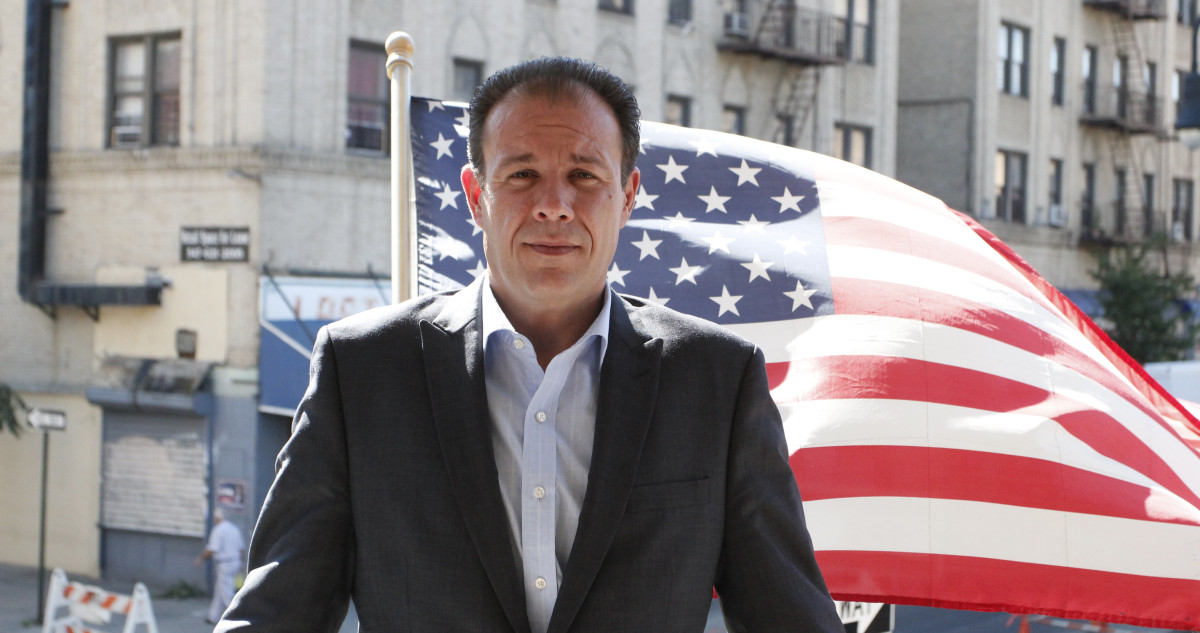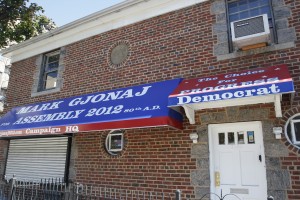
In the heavily Democratic 80th Assembly district, candidate Mark Gjonaj will likely be his district’s next assemblyman. (ANDREW FREEDMAN/The Bronx Ink)
Walking east along Lydig Avenue in the Morris Park area of the Bronx, you can’t help but notice that Mark Gjonaj is the 80th Assembly District’s new poster boy. His visage is plastered on the windows of businesses with his black hair brushed back and his brown eyes staring at those who pass by.
“Elect Mark Gjonaj. Democrat for Assembly,” the poster reads with red and white text on a blue background. Residents can follow the posters like breadcrumbs to Gjonaj’s Barnes Avenue campaign headquarters (decorated in the same colors as his posters), where he is running to be the next assemblyman for the district, which includes Morris Park, Pelham Parkway, Van Nest, Pelham Bay, Pelham Gardens, Norwood, Allerton and Van Cortlandt Village.
More posters cover the walls inside the headquarters, along with newspaper clippings about his campaign and awards of recognition from various local organizations. New York voter registration forms are piled on a table underneath an informational poster that reads “How to Become President of the United States.” That’s a goal far from Gjonaj’s mind. He’s focused on his district. He’s focused on the Bronx.
Gjonaj, 43, beat incumbent Assemblywoman Naomi Rivera in the Democratic primaries on Sept. 13 by a margin of 11 percent. His challenger in the general election on Nov. 6 is Republican Nicole J. Torres.
Torres does not have any contact information available. Multiple calls and emails to the Bronx County Republican Party’s headquarters and to Bronx Republican Party chairman Joseph Savino’s personal office were not returned.
Should Gjonaj defeat Torres (which is likely in the heavily Democratic Bronx), Gjonaj will be the first person in the Assembly of Albanian-American heritage, representing a district where he has spent almost his entire life.

Following various forms of community outreach, Gjonaj became well-known in his district. (ANDREW FREEDMAN/The Bronx Ink)
“This wasn’t about just having a voice, but the right voice,” he said. “The voice that would address the concerns and the issues of the 80th Assembly District.”
Gjonaj was born on Arthur Avenue in the Fordham Area of the Bronx to Albanian immigrant parents. After 10 years there, his family moved to the Pelham Parkway area. His mother worked as a housekeeper in Jacobi Hospital and his father worked as a building superintendent.
“I spoke Albanian before I spoke English,” Gjonaj said. “The traditions of hospitality and respect were enrooted into me growing up.”
His ethnic identity is proving important to the Albanian community in his district. According to the 2011 American Community Survey, the Bronx has a population of 12,438 people of Albanian descent – more than any other borough in New York City.
“To the Albanians, it means a lot because for so long we haven’t had someone to represent us,” said Marko Kepi, president of Albanian Roots, a nonprofit organization with a goal of building a stronger Albanian community in New York City. He claimed that the Albanian community had to contribute to politicians in order to gain their support in the past.
“Now we have one of our own, Mark Gjonaj, in the Assembly, that can speak up for the community himself.”
Kepi said that most people of Albanian descent tend to be conservative in their politics, but that Gjonaj energized that group. Albanian Roots helped the Albanian community to vote, and Kepi says that more than 300 Albanians in the 80th Assembly District registered as Democrats so they could vote for Gjonaj in the primaries.
Gjonaj said that though the Albanian community is only a fraction of the total population, he can speak their language, which may make it easier for him to communicate about community issues. He said that other elected officials have been supportive of the Albanian community, including Councilman James Vacca, Sen. Jeffrey Klein and Rep. Joseph Crowley.
Another aspect that may have helped Gjonaj topple Rivera is the fact that Rivera was fighting political scandals, including allegations that she used taxpayer money to hire her former boyfriend Tommy Torres in a part-time consulting position. The story made the front page of papers such as the New York Post and the New York Daily News. Rivera has maintained a low profile since losing the election, but she is on the ballot as an Assembly candidate for the Working Families Party. She is currently being investigated by law enforcement agencies, including the Bronx District Attorney’s office and the state Attorney General’s office.
“The primary reason to vote for him was that the other candidate, the incumbent, was sullied, was deeply stained, was seen as involved in scandal,” said David Luchins, chairman of the department of political science at Touro College and a resident of Pelham Parkway.
If Rivera’s scandal wasn’t enough of a boost, Gjonaj’s campaign has had the advantage of being well-funded.
Gjonaj attended St. John’s University in Queens and earned a degree in marketing. He is the president of M P Realty Group Corp., a real estate brokerage firm that he founded in 1999, and manages the sole property of Kramlaup Realty Corp. – an apartment building in City Island. His only political experience is as a member of the New York City Taxi and Limousine Commission. Gjonaj insisted that if he wins in November, he will give up real estate brokerage and management to work full-time in the Assembly. He said that the business would stay in the family.
From May to September, Gjonaj’s campaign received $264,443 in contributions. Many of those came from realtors, law firms and construction companies, as well as individual donors. In comparison, Rivera received $157,497.69 in contributions from March through September.
Luchins said that registered Democrats in the area received at least a dozen mailers from the Gjonaj campaign regarding Rivera’s scandals.
“When you spend an enormous sum of money and the tabloids of the city [are] running front page articles about your opponent and then you print those and hand those out over the district – I’d be rather stunned if the guy would’ve lost,” Luchins said. He added that the Bronx democratic political machine may have “pulled the plug” on her, believing that the battle wasn’t worth fighting.
The Gjonaj campaign did have some strong challenges to overcome. Rivera was a well-known, respected name until the scandal hit, and Gjonaj’s Albanian heritage may have been a deterrent to some Democratic voters. The district is 44.95 percent Hispanic.

Gjonaj’s campaign headquarters in Morris Park has hosted weekly Sunday barbecues and served as a cooling station during the summer months. (ANDREW FREEDMAN/The Bronx Ink)
Gjonaj made a name for himself in the community through a number of services and events. His “Gjonaj Cares” initiative sends street cleaning crew down 204th Street in Norwood and Lydig Avenue in Morris Park, picking up trash and litter on the high traffic streets. The Lydig Avenue cleaning began in July and expanded to 204th Street in August. He also holds weekly barbecues behind his Morris Park headquarters on Sundays, where his yellow-shirted volunteers grill hamburgers and hot dogs while he has time to chat with residents. The barbecues began in June, the month after the Morris Park campaign office opened. The campaign also hosted a blood drive in August.
“If conscientious is a good word, he is extremely conscientious,” said Jeffrey M. Panish, a volunteer for the Gjonaj campaign.
“In the community he’s known as ‘Mother Teresa with a credit card,'” Kepi said (Mother Teresa was also of Albanian heritage). “Whoever went out to ask him for help, he always helped them out. Luckily, he’s a successful man, money was not a problem for him, so he ended up helping a lot of people financially.”
Gjonaj said it’s his job – whether or not he is elected – to assist the community (Panish said working with Gjonaj was a form of “give-back.”). Because his parents received community help when they immigrated, he feels he needs to help others.
“That’s a debt that I owe,” he said. “My parents have taught me that you can never give enough. And treating people the way you want to be treated has served me very well.”
In the run up to the general election, Gjonaj is placing an increasing emphasis on jobs in the Bronx.
“One in six people can’t find a paying job,” he said. “It’s a top priority and it should be for all of our elected officials and community leaders.” He said that he and his team would be spending several weeks outlining programs to create new jobs.
To boost the economy, he hopes to use his business experience to find and use underutilized resources. He suggested that the Bronx’s parks could be used to boost tourism. He also hopes to help create a service industry that will provide more jobs.
Panish said that Gjonaj has considered the possibility of a hotel near the Bronx Zoo and botanical gardens that would keep people in the Bronx if they visit the parks or if they visit students at Fordham University.
Gjonaj is also focusing on the Bronx’s youth. He pointed out of his office window to the Bronx’s P.S. 292, under construction across the street. He feels that schools should be open longer hours to provide safe spaces for children and to provide extra help for students.
Gjonaj’s two sons, Nicholas, 13, and Joseph, 12, both attend public schools in the Bronx.
He also thinks that employment for youth can help the community.
“Putting them to work will help build their character,” he said. “It will help build their responsibility. I’ve done it all as a kid from selling flowers on street corners to delivering pizza. And I’m proud of it.” He did note that this would be extremely difficult in the current economy, when jobs are still scarce.
Gjonaj said that he is humbled by the way the community has embraced him. If he wins in November, he will represent the 80th District, but having been born and raised in the Bronx, he aims to keep the whole borough on his radar.
“I look at the 80th Assembly District without any boundaries,” he said. “The borough of the Bronx is a soft spot for me. I believe that this borough has its better days ahead and with the right leadership and the right focus, it can be the borough that by all intents and purposes it should be.”



